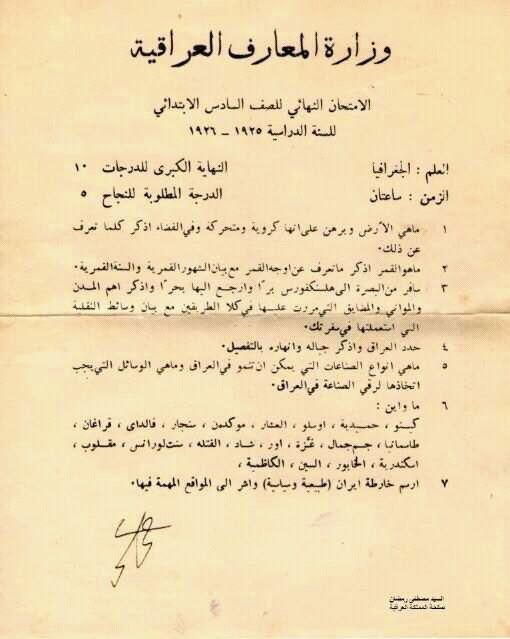Is education becoming less and less knowledge full? Are we expecting less from our students? Should we go beyond books and beyond capacity to create thinkers, philosophers, doctors who are well-prepared at a younger age?
Many questions are running around as we find a document of grade 6 final geography exam by the Iraqi Ministry of Knowledge in the academic year of 1925-1926.
The following group of questions were given to students as young as 12 years old and were expected to be answered correctly and thoroughly. Students were capable of answering and students were well prepared.
Take this exam to the 21st century. A century we are so proud of the thousands of human achievements and endeavours. Will our students be able to answer such questions that requires high analytical, reasoning or imagination skills? at 12 years old? 15? 18? or even beyond that?
The National Assessment of Education Progress of the United States announced in 2010 that only 25% of American students passed their geography tests the following are questions of geography exams of 8th graders and 12th graders in 2010.
8th grade:
Which of the following is most likely to lead to a sense of cultural unity among people?
- A diverse landscape
- A common language
- Urban migration
- Economic development
12th grade:
Worldwide, the greatest number of people who emigrate from one country to another today do so because they
- believe that moving will help them economically
- believe that moving will give them greater religious freedom
- like the climate better in their new country
- have been expelled from their native countries
This post is meant to make you think of how much more or less is being expected of the human mind today. It is meant to make you think if we are making use of our human abilities to their fullest? or are we resorting to the easy options as knowledge is more accessible this age?
"There are no constraints on the human mind, no walls around the human spirit, no barriers to our progress except those we ourselves erect."- Ronal Regan
------------------------------------------------------------------------------------------------------------------------------------
هل أصبح التعليم أقل معرفة؟….أم أصبحنا نتوقع القليل من طلابنا؟ هل ينبغي علينا أن نتجاوز الكتب والمقدرة الشخصيه لخلق مفكرين وفلاسفه وأطباء وإعداد عقلهم في سن مبكر؟
العديد من الأسئلة تتطاير حولنا عند رؤيتنا امتحان الصف السادس الابتدائي في مادة الجغرافيا بالعراق سنة ١٩٢٥.تلك الاسئلة كانت لطلاب لا يتجاوزون السن الثاني عشر، ورغم صعوبتها لكل من يقرائها الا إنه كان من المتوقع قدرة الطلاب على تجاوزها بقمة الدقة.
لناخذ هذا الامتحان إلي القرن الواحد والعشرين…الذي نتباهى بإنجازات الانسان ومساعيه في التطوير والتكنلوجيا….هل طلابنا اليوم قادرين على أن يجاوبوا أسئلة بهذه الدقة والتحليل والخيال الواسع وهم ذوي ١٢ سنة؟ أو ١٥ سنة؟ أو ١٨ سنة؟ أو حتى ما بعد ذلك؟
أعلنت مؤسسة التقيم الوطني للتقدم العلمي في الولايات المتحدة عام ٢٠١٠ أن نسبة نجاح الطلاب في مادة الجغرافية هو ٢٥٪…إستطعنا أن نجد بعض أسئلة تلك الامتحانات للصف الثامن والثاني عشر.
الصف الثامن:
أختر مما يلي: أي مما يلي قد يؤدي إلي شعور الوحدة الثقافية أكثر بين الناس
المناظر الطبيعية المتنوعة
لغة مشتركة
الهجرة الحضرية
التنمية الاقتصادية
الصف الثاني عشر:
عالمياً، أغلب المهاجرين من بلد إلى آخر يكون بسبب:
إعتقادهم بأن الهجرة قد تساعدهم إقتصاديا
إعتقادهم بأن الهجرة ستوفر لهم الحرية الدينية
يفضلون المناخ في البلد المهاجر له
طردهم من بلدهم الأصلية
هدف هذه التدوينه هو أن تجعلك تفكر بقلة مستوى توقعاتنا للعقل البشري…وما هي إمكانيات العقل البشري وكيف نستطيع استثمارها…وهل إنتشار المعرفه بيننا وسهولة الوصول للمعلومات سبب من أسباب الانحياز لعلم أسهل وأبسط؟
يقول رونالد ريغان: ليس هناك قيود للعقل البشري…ولا جدران حول الروح الإنسانية….ولا حواجز أمام تقدمنا باستثناء ما نبنيه أنفسنا



